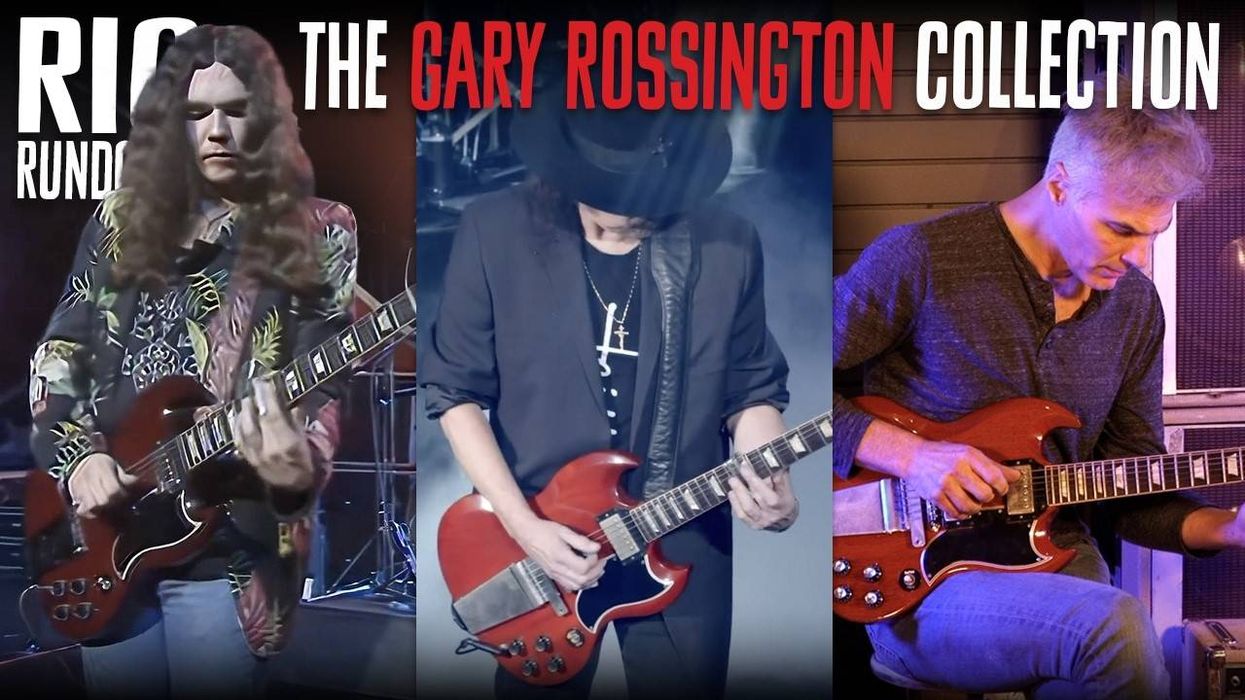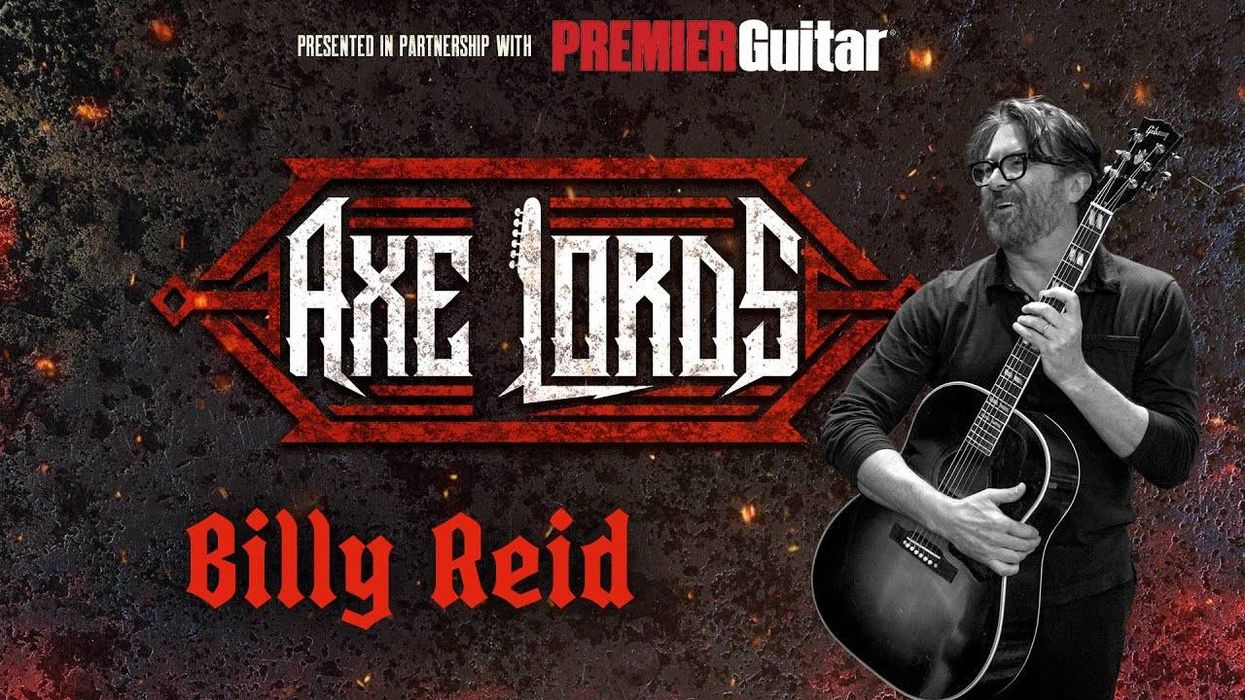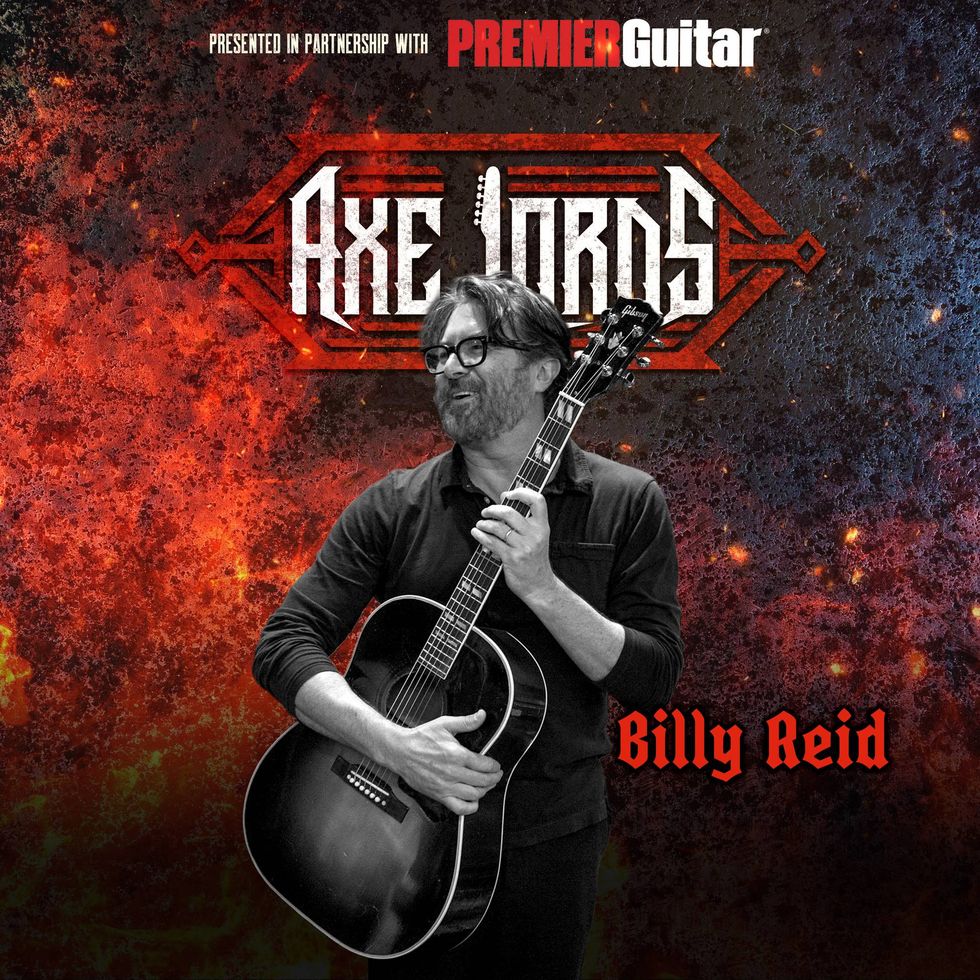"There's a certain magic, or trance-like quality, that you get from pushing repetition to the extremes," says Anton Pearson, one of two guitarists in Squid, a U.K.-based post-punk quintet that draws its power from a minimalist aesthetic. "It is definitely a big part of how we write things. We'll keep going with ideas and lose ourselves in them." So, hypnotic, repetitive guitar figures—often edging towards dissonance and played with a warm, fuzzy tone—are, naturally, a prominent feature on Bright Green Field, Squid's debut full-length release.
"When you hear repetitive music, it strikes this inner chord on a purely biological level," co-guitarist Louis Borlase adds. "For example, if you have a thought, and you hear it over and over again, you start to make sense of how you are thinking. That same thing happens with minimalism and repetition. If you can let an idea ride for long enough, you realize that it has enoughscope [to reflect] a kind of microscopic adjustment over time. That is central to the way we enjoy listening to music, but also the way we enjoy writing music."
Squid - Narrator (Official Video) ft. Martha Skye Murphy
Pearson adds, "There's the psychology of the repetitive firing of neurons, where we're constantly breathing and our heart is beating—it's a whole world to think about, which is quite fun. But, for us, I think there are loads of things we find interesting about repetition that we don't really talk about. A lot of how we write is unspoken. If something feels good, it feels good, and we don't always have a shared goal of where we want things to go. We just let them happen."
"When you hear repetitive music, it strikes this inner chord on a purely biological level."—Louis Borlase
Letting things happen—even while committed to a demanding, well-defined set of principles—has been the band's working M.O. from the outset. Squid started while the band members (who also include lead singer and drummer Ollie Judge, keyboardist Arthur Leadbetter, and bassist Laurie Nankivell) were still students in Brighton, a hip, artsy city on England's southern coast, and their first gig was a semi-regular residency at the Verdict, a local jazz club they chanced upon.
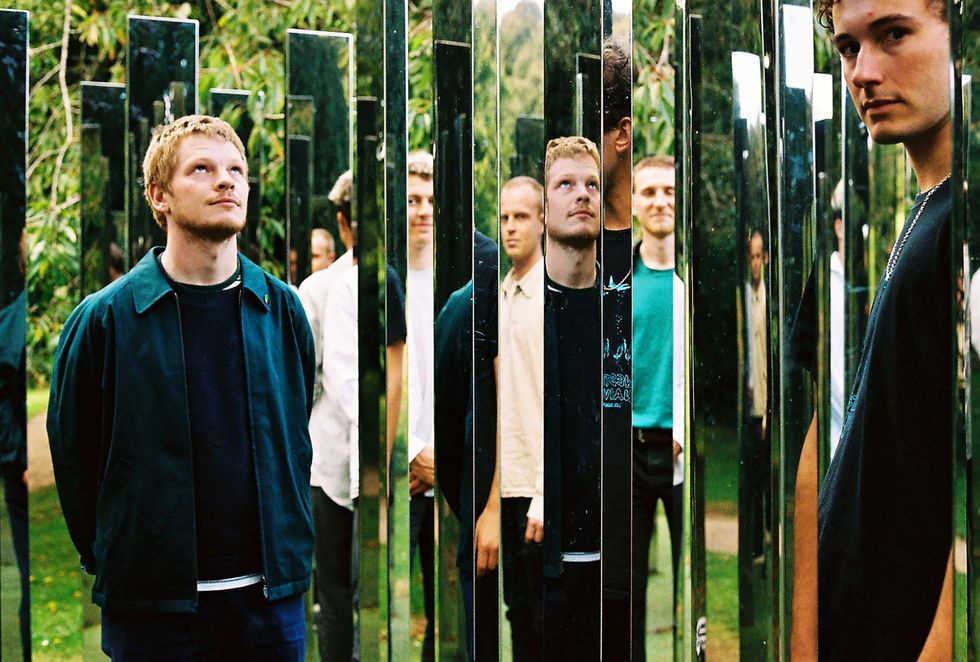
Squid are, from left to right, vocalist/drummer Ollie Judge, bassist Laurie Nankivell, keyboardist Arthur Leadbetter, and guitarists Anton Pearson and Louis Borlase.
"I was out looking for somewhere to have a drink with some friends," Pearson says. "We saw this jazz venue that we hadn't noticed before, and went in. The guy was super nice and let us watch for free. At the end, I asked if it would be possible for us to put on a show there, and he said yes. We didn't realize at the time that it was one of the most renowned jazz venues in Europe—it was in The Guardian's top five list of jazz venues in Europe—and here we were putting on a night there. We formed the band because we agreed to curate a night of music, but we didn't have any music to play, so we just wrote a set for that."
Despite getting their start in a jazz club, Squid isn't a jam band. They improvise, although they approach improvisation more like a stimulant. It's how they get the ball rolling, and a big part of how they interact as an ensemble. But extended solos aren't their thing.
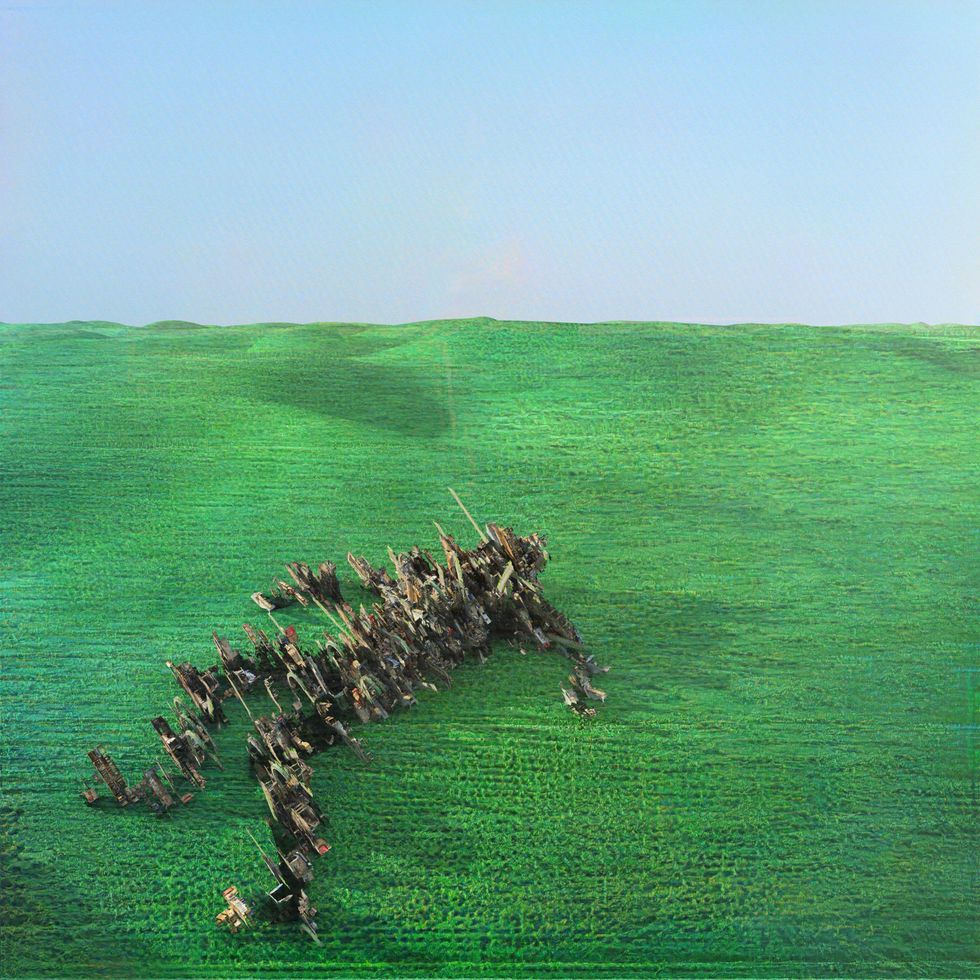
TIDBIT: Squid's debut full-length was recorded in a small London studio during a heatwave, and the air conditioning was turned off for tracking. "It was so sweaty," says Louis Borlase. "If we'd done any extra takes, we would have all probably lost about two liters of water."
"Improvisation is a compositional tool," Borlase explains. "But it's also—maybe on a more implicit, subconscious level—something that is very key to how we capture music in the studio, and maybe on a live level as well. None of us has this precious attachment to our parts to say, for example, 'I want to make sure that this certain guitar line or keyboard riff is captured at exactly the two-minute mark.' Jamming is the way in which we find an inception of musical ideas. People bring in ideas—nobody ever brings a song to a Squid writing session—and we listen to what that person has brought, as opposed to thinking about what we could do over the top of it. We very much leave that up to chance, and I think that's very important."
"Anything longer than four seconds is a bit like, 'What's this guy doing?'" says Pearson. "We have an understanding that you should never be attached to ideas, because what's the point? If you bring something small in, let that be an impetus for a process rather than a means to an end. Part of how we get to finished tracks is that someone brings in something small, it changes completely, and we realize that the thing that was brought in originally doesn't work, so we take it out. What's left are the beginnings of something new."
Anton Pearson's Gear
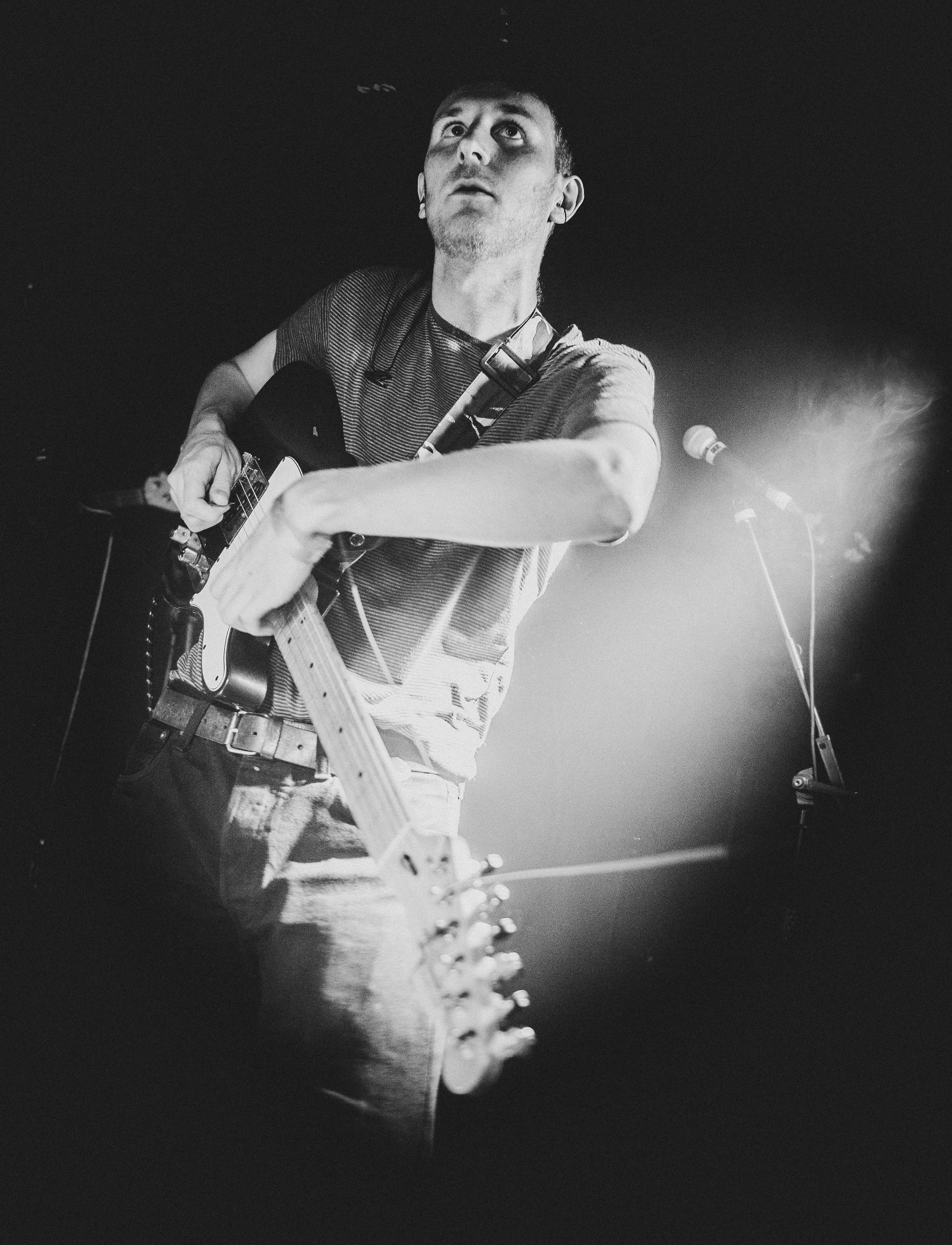
Anton Pearson explains that Squid's compositions evolve from musical micro-ideas brought in by various bandmembers. "Anything longer than four seconds is a bit like, 'What's this guy doing?'" he says.
Photo by Piran Aston
Guitars
- Fender Duo Sonic
- Mexico-made Fender Telecaster
Amps
- Fender Vibrolux
- 1967 Selmer Treble-N-Bass (on loan from a friend)
Strings and Picks
- D'Addario XT (.010–.046)
- D'Addario Duralin .85 mm
Effects
Boss DD-3 Digital Delay
Electro-Harmonix Canyon
TC Electronic Hall of Fame Reverb
EarthQuaker Devices Avalanche Run
Muzizy Fuzz
DigiTech Whammy
Dunlop Cry Baby
Electro-Harmonix Superego Synth Engine
Dwarfcraft Devices Wizard of Pitch
JHS Tidewater Tremolo
Boss TU-3 Chromatic Tuner
The band members were friends first—the band came later—and that energy is an important part of the group's dynamic and compositional process, too. "Our music is a total reflection of the way we interact on a purely hanging-out level," Borlase says. "When you hang out with your friends that you respect, and you're having a conversation or debate, you listen to each other and let that thought play out before you put your thought into the conversation. That transfer from conversation to music is key."
Not that informal, friendly, musical conversations were possible once the pandemic and subsequent lockdowns canceled a year's worth of gigs. That also impacted the types of songs Squid wrote. "We were ready to hit the road, but then, suddenly, we were left with these embryonic pieces of music that were just starting to take form," Borlase says. "Usually when we write music, we tune in to how the audience responds.
"I don't think any other instrument can keep me on my feet as much as a guitar, for better or for worse." —Louis Borlase
Seeing people dancing at certain sections, or looking focused at other sections—that naturally feeds back to us for how we choose to make certain musical moments within a track stand out. We didn't have that, so we sent ideas to each other via the internet. There are certain examples where you can feel there's an idea that snowballed and gets out of control. Take a song like 'Narrator.' [The intense, emotionally grinding, rhythm-shifting first single from Bright Green Field.] In a parallel universe, we'd run the risk of it being less of a mind fuck than it actually is. It starts with an idea and it ends up a million miles away. It is a microcosm of that idea of starting with a thought and allowing that thought to take over your mind, and you end up somewhere else in a completely different state of being. But that piece of music would have been so different if we hadn't been faced with this pandemic. We played it very rarely because there was rarely a gig where we could play it in front of people."
Louis Borlase's Gear
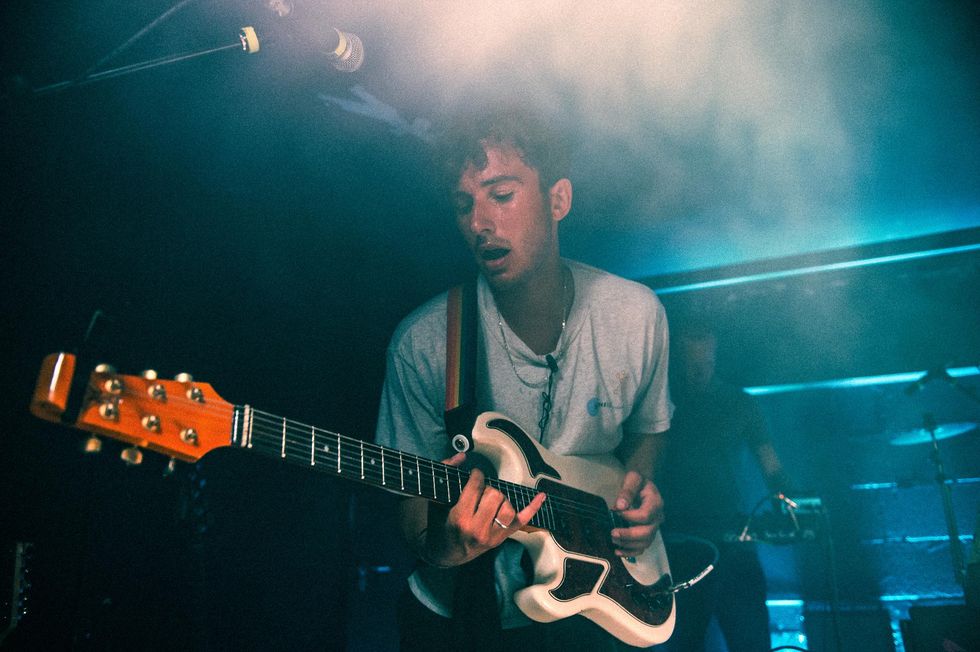
"Improvisation is a compositional tool," explains Louis Borlase. "But it's also—maybe on a more implicit, subconscious level—something that is very key to how we capture music in the studio, and maybe on a live level as well."
Photo by Piran Aston
Guitars
- Burns Marquee
- Fender Jazzmaster
Amp
- Fender Twin Reverb
Strings and Picks
- D'Addario XT (.011–.056)
- D'Addario Duralin .85 mm
Effects
- MXR Carbon Copy
- Line 6 DL4 Delay Modeler
- Boss Blues Driver
- Alexander Pedals Syntax Error
- TC Electronic Sub 'N' Up Mini
Bright Green Field was made with award-winning producer Dan Carey at his one-room studio in South London, where his console and outboard gear share the same space as the bands he records. His production style—immersive and focused on live takes—was key to capturing Squid's loose, improvisatory energy.
"It was the middle of the summer, and it was boiling hot," Borlase says about cutting "Narrator." "The track that you've heard is the second take. There was never any need for a third or fourth take, because so much of it is based around improvisation. We never play it the same way twice. I guess the reason that second take of 'Narrator' felt so good is that, early on, you capture that nervous energy. It was so sweaty. If we'd done any extra takes, we would have all probably lost about two liters of water."
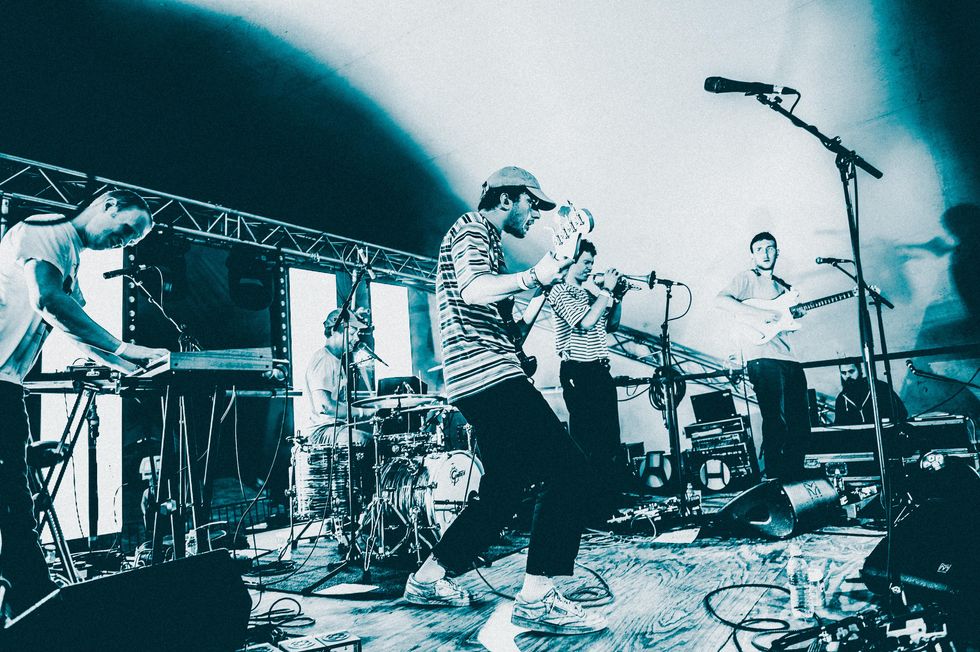
Live, Squid play with the same intensity and precision as exhibited by minimalist punk progenitors Wire—another two-guitar band noted for their carefully knit interplay.
Photo by Piran Aston
As a guitar band, Squid's approach to the instrument doesn't have much to do with the glory days of tight pants and arenas—or even '90s-era flannel and grunge. "There is a whole history you're engaging with when you touch the guitar," Pearson says. "And we're still interested in that history. We're interested in finding ways of making new stories. They say the electric guitar is so successful because it is that perfect marriage of technology and a gestural nature you get from acoustic instruments. You can go as far as you want in terms of electronic technology with it—right up to plugging it into a computer—but at the same time, you still have the gestural nature, that kind of visceral nature that you get when you see someone play it live. I studied West African music at university, and for a lot of communities, like in Mali and Niger, it is still such an important symbol—not just for music, but also resistance. It is still an interesting tool and it still has relevance, but it is important to keep thinking of ways to innovate and change people's perceptions of it, and I think we're trying to do that a bit."
Innovation, at least according to Borlase, may also just be the nature of the beast. "The guitar is as much a cultural object as it is a musical object, and that still hasn't faded away," he says. "Guitar is something that you feel you're saying something with, regardless of what notes you're playing. The guitar is a confusing thing, unless you're super high-tech and everything makes sense in your head. It's this thing that allows you to have a voice and be able to always aspire to those people who came before you. For us, there are a lot of bands before us that have not only played guitar, they have also challenged their own ways of thinking. If you continually confuse yourself, not to mention if you knock into something mid-song and realize, 'Why does this sound so bizarre?' I do that all the time—plus juggling three or four tunings and then using a capo. I don't think any other instrument can keep me on my feet as much as a guitar, for better or for worse."
Squid - The Dial | Stolen Sessions
On the good foot, Squid deliver their 2018 single "The Dial" at the Windmill, a pub in London's Brixton district known for championing cutting-edge music. Note the band's absolute polyphonic devotion to the groove.











![Rig Rundown: Russian Circles’ Mike Sullivan [2025]](https://www.premierguitar.com/media-library/youtube.jpg?id=62303631&width=1245&height=700&quality=70&coordinates=0%2C0%2C0%2C0)

